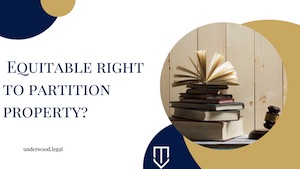
When a title owner sues to partition the property, then the matter is relatively straightforward. On the other hand, when a person claims to be an owner of the property but does not appear on the title, can they still sue to partition the property?
Who can sue for partition?
A legal titleholder—as well as the holder of an equitable title to an undivided interest—may sue to establish his or her right and to obtain a division of the common property. (Varni v. Devoto (1909) 10 Cal.App. 304.) Not all equitable titles, however, are created equal. Indeed, the partition statute explicitly lists the types of equitable interests that may have a right to seek recourse through the partition.
Code of Civil Procedure section 872.210, subdivision (a), permits a partition action to be maintained by “(2) An owner of an estate of inheritance, an estate for life, or an estate for years in real property where such property or estate therein is owned by several persons concurrently or in successive estates.”
The holder of an equitable interest may not partition the property if that interest does not fall within one of the classes named in the statute. (Clough v. Compton-Delevan Irr. Dist. (1938) 12 Cal.2d 385.) As only those named by the statute are proper parties in a partition action, the question is whether a party can establish an equitable title to fall within the meaning of the statute.
What are the limits on establishing an equitable title?
A full equitable title may be enforced in action for partition although the statute of limitations may have run against an action for specific performance to compel a conveyance of the property. (Luco v. De Toro (1891) 91 Cal. 405.)
Generally, the statute of limitations is applied to the specific performance of a contract in the same manner as if the contract were the subject of a suit at law for damages. Specifically, the statute of limitations to enforce a written contract is four years, and the statute of limitations to enforce an oral contract is two years. Alternatively, an action for specific performance to recover real property is subject to the five-year statute of limitations. (Pourt v. Department of Transportation (2018) 31 Cal.App.5th 200.)
Alternatively, a vendee who has paid the full purchase price and is in possession of the property that they purchased, but has not obtained legal title, is not barred by any statute of limitations and may sue for specific performance at any time as long as this condition exists. (Hermosa Beach Land & Water Co. v. Law Credit Co. (1917) 175 Cal. 493; Frank v. Tavares (1956) 142 Cal.App.2d 683.)
Conclusion
Thus, a party with an equitable title listed within the statute and still within the five-year statute of limitations may still be able to seek partition in accordance with the rights of specific performance.
A party who believes that they may have an equitable claim to the property and is considering seeking a partition of the property may benefit from good legal advice on the topic.
If you find yourself contemplating a partition action, or faced with defending one, then please contact Underwood Law Firm, P.C. for an initial consultation.










